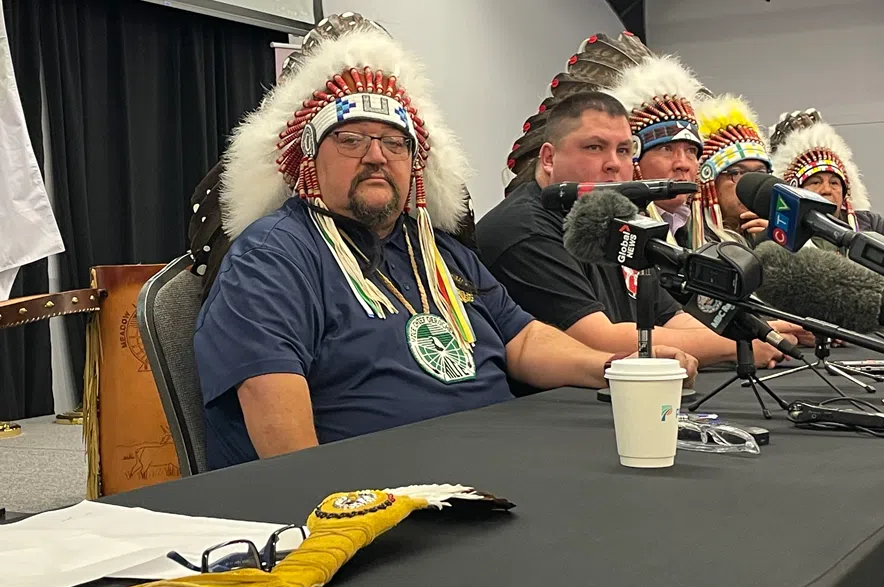About a month after the Red Pheasant Cree Nation partnered up with the Saskatchewan Marshals Service, other First Nations communities in the province are looking to do the same.
Leaders from the Meadow Lake Tribal Council and its communities met on Wednesday at Prairieland Park in Saskatoon, where they said the current policing model using the Saskatchewan RCMP is failing, creating a public safety crisis.
Read more:
- Red Pheasant first Sask. First Nation to sign Marshals Service MOU
- Regional policing study finds RCMP not serving community needs
- Saskatchewan Marshals Service graduates first class of 10 officers
Tribal Chief Jeremy Norman said there’s a lack of police presence in the tribal council’s communities, which is leading to “serious injuries and deaths.”
The Meadow Lake Tribal Council includes nine First Nations communities in northwest Saskatchewan, and Norman said it’s not unusual for people to have to wait over an hour for police to arrive after calling 9-1-1. But waiting even five to 10 minutes for the police would cause “an outrage” in large cities, he said.

L-R: Meadow Lake Tribal Council Tribal Chief Jeremy Norman, Ministikwan Lake Cree Nation Chief Amanda Ernest, Meadow Lake Tribal Council Dene Vice-Chief Norma Catarat, Meadow Lake Tribal Council Cree Vice-Chief Richard Derocher, Clearwater River Dene Nation Councilor Roy Cheecham, Waterhen Lake First Nation Chief Blaine Fiddler, Canoe Lake Cree First Nation Chief Francis Iron, English River First Nation Chief Alfred Dawatzare, and Makwa Sahgaiehcan First Nation Chief Melvin Mooswa. (Marija Robinson/650 CKOM)
Dene Vice-Chief Norma Catarat agreed, saying “response times are horrendous.”
According to Catarat, it took police an hour and a half to respond after someone died in one of the tribal council’s communities, and it took another 18 hours before a coroner arrived.
With such slow response times, some leaders said they’ve had to allocate hundreds of thousands of dollars towards enhancing security, instead of channeling those funds towards other areas like mental health and addiction support or community housing.
One of the communities paying for extra security is the Canoe Lake Cree First Nation, and Chief Francis Iron said the money is being spent “just to keep gangs out.”
Without a proper police presence, Iron said he’s occasionally had to evict drug dealers and gang members out of homes personally.
“We need police there with us to keep peace,” he said. “What if we go into a gang member’s house and they have guns?”
It’s a situation that Iron said he’s faced before.
The public safety crisis has reached the point where some people feel scared to sleep in their homes, according to Clearwater River Dene Nation Councilor Roy Cheecham.
‘Opportunity’ to partner with the Sask. Marshals
While the tribal council issued a statement saying it wants “a comprehensive, First Nation-controlled and fully-funded policing service,” that wasn’t the argument presented at the news conference on Wednesday.
Cree Vice-Chief Richard Derocher said the option of self-administered policing is “so far away from where we are.”
Derocher said the Prince Albert Grand Council has been working at getting its own police force for nearly 10 years.
“Are we we going to wait 10 years to get solutions in our communities? I don’t think so. I think those solutions have gotta be sooner than that,” he said.
Derocher said the quickest option is to partner with an existing police service – the Saskatchewan Marshals Service.
Even though the provincial police force is fairly new and not yet fully staffed, Derocher said it presents an opportunity for a new partnership.
“We’re looking for a fix today,” he said.
Talks with the provincial government are already underway, according to Derocher. He said the council has already spoken with its local MLA, Jeremy Harrison, and plans to hold further discussions with the provincial government about the potential partnership.











